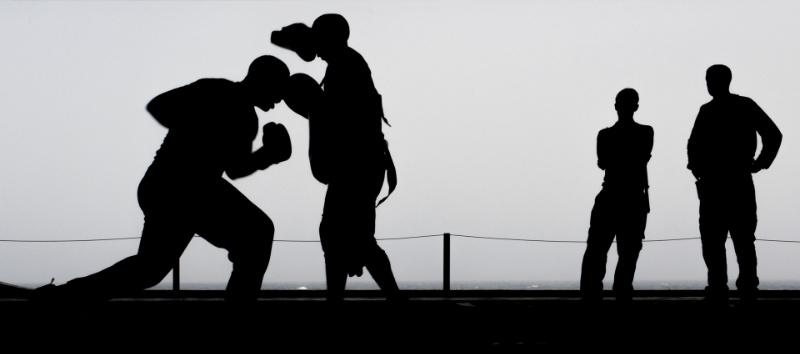You Can Say "You" To Me! - The Ramifications of Formal and Informal Ways of Addressing People
When you first come to the USA as a European, you notice many peculiar things. The vibe is different, the reactions are incalculable and you find yourself in all sorts of unlikely (and often embarrasing) situations.
One of the things that struck me most in the first weeks, was the usage of the term "you" and how it is used.

Many languages in Europe have at least two different forms of the word. One is used to address your friends and family, the other one is used for pretty much everyone else - teachers, strangers, your boss at work, the new neighbor - anyone you have not had the pleasure of getting to know deeply.
Anyone outside your close social circle.
Coming to America this seems like a very easy change, because suddenly it's all just "you" - "Thank you very much Mr. mailman!", "how are you doing today Mrs. Smith?", "glad to meet you Mr. President!"
It's weird!
To a European that is weird!
You see, in Germany, France, Spain, and probably the majority of countries in Europe with their different languages, we spend quite a lot of time bitching about the traditional difficulties in choosing how to address people, about the sort of distance it creates in a seemingly artificial manner, and about the built in... elitism this often represents.
Say you know for fact that your boss is a jerk who doesn't have a shred of decency, but still you have to address him in that subordinate way, using the formal you. This is even worse when he does not address you the same way, but calls you by the familiar you, much like the patriarch of the family would've addressed his children not a century ago, and yet expect them to use the formal you to address him.
The existence of the two you's in Europe creates all sorts of confusion, because sometimes you seem kind of familiar to someone, and they will use the formal you, when actually you two are well beyond that point already and feel slightly stupid for not having recognized it. This then becomes a hurdle that is always somewhat expected to happen eventually with someone you meet, which can be mildly annoying when starting off conversations with people you haven't talked to before.

It can become somewhat of a game, requiring lots of calibration and experience, to avoid that rather uncomfortable faux pas which usually makes both sides feel embarassed.
But sometimes it's the opposite, which is even more heart-wrenching if you mess up.
For example:
You meet the parents of your girlfriend for the first time after having shared your bed with her for two months. And you feel kind of familiar with the parents - after all, you almost knocked up their daughter by accident and have already heard all sorts of family stories and dirty laundry most people would never get to hear...
So you address the parents at the dinner table with the familiar you - maybe because you mis-calibrated their level of endorsement, or because you simply forgot to allow for that extra bit of distance. This can be interpreted as 'having no respect', if you're unlucky. So dad looks at you with that serious look, commanding something like "now boy, I don't think we are quite there yet! This is my daughter, and you better tread carefully here."
Then, with other dads it's no issue at all. If they're socially adept, they will offer you the familiar you long before you get to that situation (because they know it will make it easier on you), which often is all the more reason to hug the guy right then and there and become very good friends from the get-go.
But you never know, it's always kind of a minefield.
The formal you creates both distance and relays a sense of respect, which tends to separate strangers more than I have experienced in America, where everybody is just called "you", no matter their background, age, qualification or any other parameter. This makes social calibration in the US a comparatively easy undertaking when addressing people.

On the other hand sometimes it can be really weird because as a continental European you are very aware of this, where hardly any American knows about this difference at all, unless they have studied French or Spanish or German, and then they would go on about "how stupid that rule is and how confusing it must be to learn", along with all the conjugated verb forms you have to memorize of course.
"You crazy Germans, making everything so damn complicated!"
In America , it struck me as particularly odd, when strangers would have an argument at a cash register, or over the phone, or about the ensuing election between Bush and Kerry, when they would address each other with you while almost wanting to hit each other in the face with their fists. Clearly they would have both benefited had they only been equipped with a way to put some 'polite' distance between each other. At times it felt almost comical to me, like watching somebody trying to eat a soup with a fork, having never heard of a spoon at all.
So in these argument-situations both parties would have to achieve the desired effect with the tools that they did know - like conjuring up nasty insults or even threatening each other with some sort of violent act - all while still addressing each other in the familiar.
It was hilarious to me, and other times it was rather sad.
Then again, using the formal you can imply both respect or distance in Europe. And often, you can only tell by the context or tone of voice. So it's equally funny sometimes to hear arguments in Europe, where the formal you is used but both sides actually try to insult and hurt one another. It could - in that case - be beneficial for insulting someone to use the familiar, when it explicitly has not been warranted by the other party, implying disrepect intentionally...

Are you still with me...?
Poor Americans <3
You see both views have their ups and downs, most like anything in life.
For example my first cheesy Thanksgiving dinner with the greater family was really easy to navigate. I had been welcomed with open arms by the whole family - being the "German boy" - (everybody had German roots in the family I was staying with, as most people do in the US) and I would take full enjoyment in taking any chance to address others directly - because there simply was no risk of miscalibration on my part :)
I would simply say:
"Could you please pass me the gravy, grandpa?"
And grandpa smiled at me, passing me the gravy mentioning what a polite guy I am. No harm done. Awesome!
I had always been good with parents, but I thought meeting the parents of my first crush here would be a piece of cake!
So you want to hear the downside? It's the bad landing after a high flight, it's the rough comedown after a serotonin-overloaded night, if you know what I mean:
The moment I set foot in a German airplane again after 10 months in America.
On my flight to the United States I had felt freed, because I was hit with a noticeably different and friendly atmosphere in the plane: Random strangers engaging in conversation with each other on all sorts of things - trivial and serious. A beautiful flight attendant lady asking me "how are you doing today Sir?"....
It was magical, it felt like humanity could finally just get along. And I was stunned how great the effect was on my mood and outlook on life, just being in the presence of this contact-enabling mentality.
But now, 10 months later, here I was - having landed in Frankfurt after my long American trans-atlantic flight... And you must know that Frankfurt is the business- and banking-oriented German metopolis per se. So I'm about to board the first domestic flight in my home country after 10 months of absence...
I entered the plane and... it felt like a graveyard.

People were silent, all you could hear was the shuffling of papers and the magazines people were forcing themselves to read, the occasional clearing of the throat and coughing, as well as very toned down islands of conversation, so that - ideally - nobody could eavesdrop on them having their superficial exchange of words, or whatever!
It was pure pain for the soul!
I thought I had suddenly been tossed into a mental asylum, and then I remembered that this was the way it had always been in Germany, as long as I can remember.
I had simply forgotten... and willingly so.
It's like: "These people are strangers so why would we engage with each other!?"
And it was really nerve-wrecking to me after all my time in the US, being surrounded by that totally different vibe there of openness and willingness to connect.
But the silence wasn't even the worst of it!
The worst of it was that when something was said, it was done exclusively in the formal way. But in such a weird and impolite manner, that it had never hit me that hard before as it did on that day (notwithstanding psychedelic bad trips which I will not get into right now).

It dawned on me that I had underestimated the importance of language for human interaction in terms of sharing and willingness to connect by the very pronouns we use every day to address each other.
I suddenly saw that it was not only using that formal you address, but that the mere use of it implied a whole mindset which was so deeply engrained into everyone that we as Germans notice its subtle effect on our culture as little as Americans notice their openness-mindset engrained into their common use of language.
And here I found myself amongst dead-serious business Germans in suits - and me wearing my worn-out jeans, having been totally Americanized in heart and spirit.
And I'll never forget : in the row behind me, the German gentleman did his best to say as little as possible in order to open up as little as possible, using that formal you to grumpyly inquire of his neighbor to "let him through please". But that would be saying too much because "please" was not a part of it at all, not even in intent. It felt more like the equivalent of an American saying to a stranger: "Will you move your goddamn ass already? I'm trying to get through here, can't you see that?!"
Ouch.
It was the way someone in Germany who had a really bad day would need to ask you something but prefer not to talk to you or acknowledge your existence at all - the total opposite of what happens when you enter any American store and are greeted by the owner in an damn-near friendly way.

In Germany the situation can often be quite the opposite. And I was harshly reminded of that. Boy did that hurt.
These were my fellow countrymen?!
I wasn't really sure anymore...
After five minutes in the plane I felt depression coming on and I remember thinking "my God!" I must've been on vacation for a year, because this really felt like the first day of school with seriousness and bullshit-rules setting in, after a long great summer with your friends partying. Was this really my home?
It sure as hell didn't feel like it! I wanted to go back, and I wanted to go back now!
It took me a while to recover from this hit to the heart, and it never really left me since that day. There are pros and cons of having two ways to address people around you, but after the US-visit, the cons definitely stood out to me, like the elephant in the room nobody would (dare to) notice. Or a screaming bat or whatever.

The way of choosing how to address someone , depending on your attitude towards them and your estimation of their attitude towards you can be a real nuisance, but it can even turn to being abused in this weird distance creating way by sheer automation of conditioned behavior. It fuels a head trip - long before either of you start to actually talk to each other.
Most Americans never had any idea what I was talking about when I mentioned this to them, so in closing the best I can do for you is to relay the example I told them:
It is somewhat different but on a feeling-level still similar to addressing your house maid in former times:
"Would you please be so kind as to wash my son's clothes today?"
versus
addressing the king of the land in terms of:
"Would your Majesty be so kind as to grant my son an audience this afternoon?"
Feel that difference?
Now imagine addressing strangers by default in a similar way, because you have been taught it.
Most Americans I met shivered at the thought, whereas most Germans I meet can see a lot of benefits to this custom, especially the older generation. The younger the people the more likely they will revolt against this formal way of addressing others but it is still the norm in most places you go in Germany.

I feel in recent decades it has become somewhat less prevalent to use the formal but only in isolated areas. People are more willing to offer each other the familiar rather quickly, maybe because they are sick of the mind games and the distance that they then have to overcome again with lots of effort on both sides...
There are now restaurants (at least in the North of Germany), where it has become kind of a custom to address the customers with the familiar you. Granted, some elderly people can be quite confused by this at first, but once they see that this is "normal" here, and that the waiter will address university students, his own colleagues, and all age ranges of customers in this way people can let go there grumpiness much more easily.
You could say it eats away at German culture, and it oversimplifies our language, which is a damn shame in a way...
At the same time though it builds bridges between people, and finally gives the somewhat closed-off Northern German mindset a way to better bridge that gap so that they can get to know each other, instead of pretending by some tradition of semantics that they're not there at all.
publicdomainpictures.net/view-image.php?image=167249
publicdomainpictures.net/view-image.php?image=206380
publicdomainpictures.net/view-image.php?image=232657
publicdomainpictures.net/view-image.php?image=232580
publicdomainpictures.net/view-image.php?image=229566
https://unsplash.com/photos/YWAVTqGnyjI
https://unsplash.com/photos/1AhGNGKuhR0
https://unsplash.com/photos/IY1sRDxNWN4
https://unsplash.com/photos/DrLtv2bgXSc
yup,,wow post, I upvoted and followed you. Can you check my last blog post ,
https://steemit.com/travel/@rockyhandsome/wah-taj-mahal-awesome-trip-travel-destination-7nth-wonder-of-world
I am normally not like this, but I literally posted this not a minute ago, and it would take you at least 7 minutes to read through the whole thing.
No more alphabet letters for me tonight, maybe tomorrow
however the title of your post looks intriguing ;)
I enjoyed your photos, awesome!
However, there is a lot of text in your post that is copied off the internet, please do not do that on steemit. Write your own text, and it would be much more interesting to everyone, and earn you more steem as well.
Good luck
Congratulations! This post has been randomly Resteemed! To join the ResteemSupport network and be entered into the lottery please upvote this post and see the following rules.
thanks